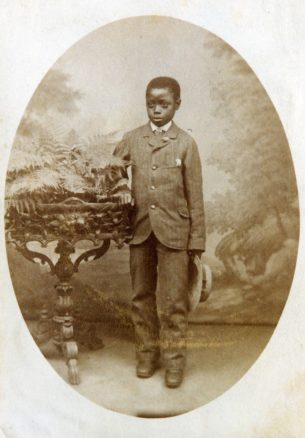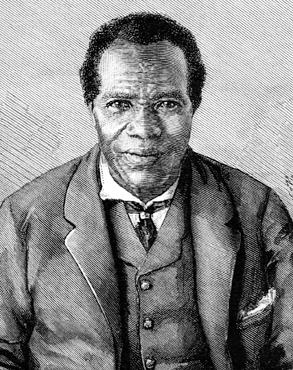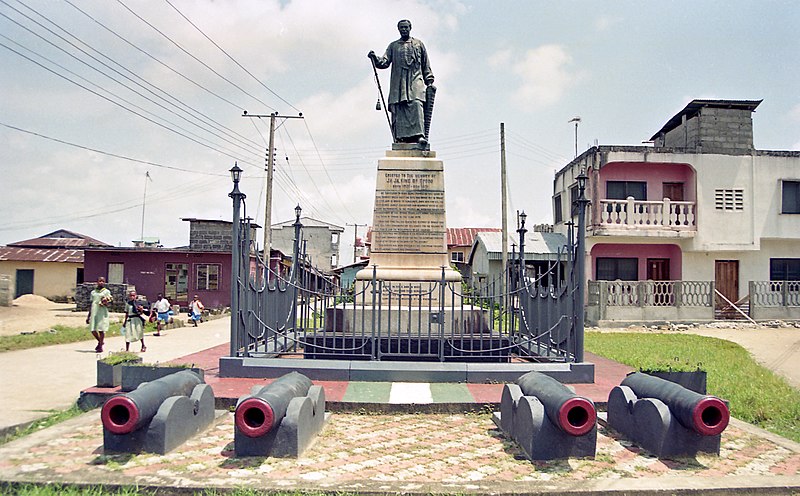Becoming a king when you were not born into a royal lineage is nearly impossible. Sure, biblical characters like David did it, but that was in special circumstances. As it turns out, there was someone else who had a similar fate. Even more impressive is that this person was formerly a slave. Yes. From slavery to the palace. If you’re doubting us, then you’ve never heard of King Jaja of Opobo.
Jaja was a great king who left behind a great legacy. A mere slave boy that overturned the norm to become a king despite his background. How did this happen? If you’re interested in the story of one of Africa’s greatest kings, you’ll find it here. Behold the story of the great King Jaja of Opobo — a slave turned king.
Who Was Jaja of Opobo?
Jaja of Opobo was the founder of Opobo city-state in the present-day Rivers State and the first king (Amanyanabo) of Opobo. King Jaja of Opobo was formerly taken into slavery by slave raiders when he was still a youth. He served several masters and went through wars as a slave until he finally became a king. But it wouldn’t really be a story if his life was that straightforward, right? Let’s see what made Jaja of Opobo special.
Jaja of Opobo Sold Into Slavery
Jaja was born in Umuduruoha, Amaigbo, Imo State, in the year 1821 (however, his birth name is unknown neither is his parents’ identity). In the 1800s, the Igbo land was in chaos as Europeans had invaded the land for slaves in exchange for firearms, tobacco, and bullets. Black slave raiders also annex various regions, selling Igbos to slavery.

During this chaos, Jaja of Opobo was kidnapped and taken to Bonny Island in Rivers State. There, he was renamed Jubo Jubogha by his first master. Later on, he was sold to Chief Alali, who was the head of the Opobu Manila Group of Houses. It was in this master’s house he was given the name “Jaja” (this was due to the fact that the British could not pronounce his name, “Jubo Jubogha”).
After several years, Jaja finally graduated from servanthood or apprenticeship. Then, after his master’s death, he took charge of the trades his master left behind.
Jaja became the head of the Anna Pepple House Merchant Faction of Bonny Island. After being passed around for so long as a slave, Jaja had learned a thing or two about business and politics. His time managing the faction saw Anna Pepple absorb other trade houses until there was a huge dispute in the houses at Bonny with the Manilla Pepple House which was led by Chief Oko Jumbo. The pressure continued for a while before Jaja decided to break away and form the Opobo city-state.
Opobo Before the Opobo city-state Formation
Opobo gained its wealth from the profits that came from slave trades from the 15th to the 18th century. This was a thriving business that earned many people wealth and affluence. However, the abolition of the Slave Trade in 1807 meant the new money-making business was the palm oil trade. This trade thrived so well that the region was named the Oil Rivers area.
The Opobo City-State
Jaja established a new settlement (Opobo) in 1869, where he became the King Jaja of Opobo. There, he became a man of status, free and independent of Bonny. His efforts and skillfulness in ruling saw Opobo dominating the region’s lucrative palm oil trade. Opobo also housed fourteen trade houses, formerly part of Bonny’s eighteen trade houses.
King Jaja of Opobo, during his reign, also blocked the access of British merchants to the interior. This was a smart decision that gave him a monopoly in the market. He became so successful that he never needed the services of British middlemen to ship palm oil to Liverpool = he directly shipped there without obstructions.

No doubt, King Jaja of Opobo was not only a wealthy merchant, but he was also a man of honor and power. Once, he lent his help to the Queen of England in a battle in the Gold Coast (the Ashanti war). As a reward, Queen Victoria awarded him a sword of honor in 1871.
Read: Fidel Castro: Is He Truly an African Hero?
Double-Dealings Against Opobo
The Oil Trade Business in Opobo continued to thrive, and the lands were also expanding. So, the Europeans wanted to take control of the market. Of course, this brought conflicts between Jaja and the British top sales and business tycoons. One of them was John Holt of Liverpool.
Jaja avoided attempts by Holt to penetrate his market in Qua Ibo River, but the Liverpool supporters of the African Association pressed for strong action against him over “falling rates of profit.” This was probably made-up story to put pressure on Jaja.
Innovative Tech Solutions, Tailored for You
Our leading tech firm crafts custom software, web & mobile apps, designed with your unique needs in mind. Elevate your business with cutting-edge solutions no one else can offer.
Start NowConsidering “national interest”, King Jaja showed his ruthlessness to the Qua Ibo people in 1881. This resulted in him raiding seven of their villages, capturing many, and prosecuting around 100 people for taking part in direct trade with the Europeans. As a device to gain control of the Oil region, the British came up with tricks and laws to outrun Jaja.
But he constantly overcame and outplayed their tactics, which angered the British.
The Two Difficult Choices
At the 1884 Berlin conference, the other European powers designated Opobo as British territory, and they soon moved to claim it. When King Jaja didn’t stop taxing British traders, Henry Hamilton Johnson, who was a British vice-consul, invited him for negotiations in 1887.
By September of 1887, Johnson brought a “Warship” (HMS Goshawk) to Opobo and invited King Jaja on board, assuring him of safety. King Jaja agreed and went on board. On his arrival, Johnson gave him two bad choices. He stated that if King Jaja would not grant the Europeans access, he would have to return home and face war with the British Navy. But if he wouldn’t settle for that, he would have to go into exile.
Of course, King Jaja was a man of value, principle, and honor, he would never bow to such. He chose not to back down, which led to his arrest by the British. He was then tried in Accra, in the Gold Coast (now Ghana). Afterward, he was taken to London, where he met with Queen Victoria and remained her guest at Buckingham Palace. Shortly after his arrival, he was deported to the West Indies, but no one really knew what transpired between him and the Queen.
While King Jaja of Opobo was in exile in the Caribbean, he was said to have caused immense civil unrest among the people of Barbados.
King Jaja of Opobo’s Fight For Freedom
King Jaja continued to fight and campaign for his freedom even after he was moved to the island of São Vicente, Cape Verde, off the coast of West Africa, to avoid an uprising. Eventually, he regained freedom after years of fighting against his wrongful abduction. The Parliament permitted him to be repatriated to his Kingdom State of Opobo. Already close to aging, Jaja yearned to see Opobo again.

The King Returns
When the people of Barbados (mostly of people of African, specifically Nigerian descent) got the news that a captured African king was coming to the island, they all gathered to give him a befitting reception.
The British wanted to try him on the Island for his “crimes.” This didn’t sit well with the people as they felt insulted because an African King had been subjected to such ridicule and shame.
Right about when the ship got to its docking site at the side of the water, the people of the island rushed and camped at the waterside. The plan was to block the British from taking King Jaja to the Colonial courthouse in the middle of the Village’s square. And they camped there until the next day.
The following day being a Sunday, the Islanders had their church service at the waterside, just right by the ship, with King Jaja lurking around as the service went on. Before the end of the service, he made his way out, and the women cried out, welcoming him, “a King from their ancestral mother land”. The crowd beamed with joy and zeal. On seeing this, the British feared that they may plan an escape for him. Fearing an uprising, they grabbed their bags and sailed back to St. Vincent.
King Jaja was moved around in the West Indies, so his family lineage can be traced to St. Vincent. Some reports even stated he got married and had children.
As a result of the way King Jaja carried himself with pride and held his head up high on the highland, people in the West Indies (Barbados and St. Vincent) adopted “Jaja” as a common slang used to describe someone who is arrogant and carries him/herself with an air of pride and dignity.
The Murder/Death of King Jaja of Opobo And the Ill-fate that Befell Opobo
In 1891, King Jaja was granted approval to return to Opobo but sadly died on his way. He was said to have been poisoned with a cup of tea in June. After he died, his body was shipped to Tenerife in the Canary Islands, where he was buried.
Following King Jaja’s exile and death, the power of the Opobo state declined drastically. The land became easily accessible to slave raiders, was a bed for riots, and the British exploited the land for its natural resources.
After several protests and pleas, King Jaja’s body was exhumed and sent back to the Opobo kingdom, where he was properly laid to rest. Today, his remains are in a sacred (grave) shrine behind the Palace of the Amanyanabo of Opobo.
Before You Go…
Hey there! Now, you know a little bit more about an African hero, King Jaja of Opobo. I hope this was insightful. But one last thing before you go. Our team at Nicholas Idoko Technologies can help you build custom software development.
We can develop web, mobile, desktop, and blockchain applications tailored to your budget and vision. We are also interested in your growth and will continue to track your progress as you scale your product. Our work cuts across several industries, including eCommerce, online games, voting and payments, blockchain, and many more.
We’re readily available for consultation. Contact us now.











